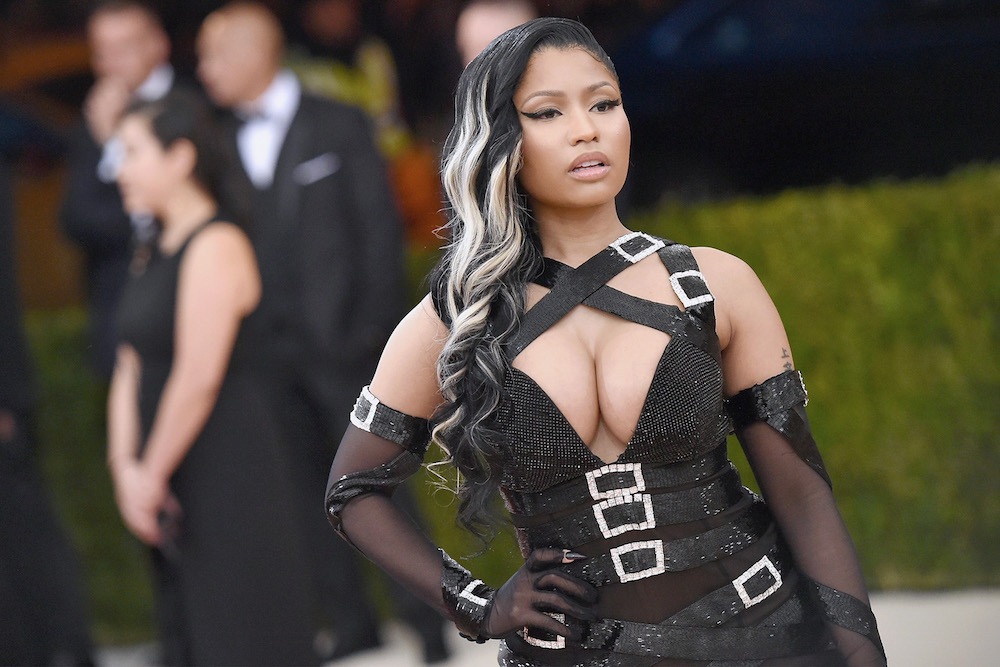Release Date: December 16, 2014
Label: Cash Money
Earlier this fall, Nicki Minaj announced that she’d need to push back the release date of her third studio album, The Pinkprint, by two weeks. Though she offered no concrete reason at the time, listening to the 16-track full-length (that’s excluding any bonus tracks) lifts the curtain that has long shielded the Queens rapper’s inner workings. It’s widely rumored that she split up with her longtime boyfriend earlier this year, and The Pinkprint‘s delays could very well have stemmed from the necessity of time to work out her feelings into words. It’s easy to make assumptions about Minaj’s targets, then, but she’s careful to disclose just enough — the loss of a pregnancy, a broken engagement, identities kept to single names or shielded entirely — to let the listener fill in the blanks.
Minaj has never been one to play by a record label’s rules, though she’s known for keeping her ear to the streets in terms of her output. Earlier this year, the star released a handful of heavy rap cuts (“Lookin Ass,” “No Flex Zone,” and “Senile,” the best among them) that silenced those who claimed she’d lost her edge. The Pinkprint overwhelmingly shifts the MC out of the competitive mindset into a more personal one than anything she’d previously put her name on. “All Things Go” and “I Lied” stick their moody middle fingers up at conventionally upbeat album openings, choosing instead to ease any outsiders expecting a Roman Zolanski project into Onika Maraj’s raw, real wallowing.
It’s an album lacking tangible hits, but it’s Minaj’s first LP that demands a full, start-to-finish listen to truly understand its mission. “The Crying Game” blurs the line between rap-Nicki and pop-Nicki nicely, though there’s never really been quite such an easy divide between the rapper’s leanings. The song’s hollow bells and muffled strings — plus a gorgeous chorus sung by Jessie Ware — complement vulnerable lyrics like, “Another slap to the face / Another uppercut / I’m just abusive by nature / Not ’cause I hate ya.” Remarkably frank confessions like this one explode all over The Pinkprint, surprising for an artist more known for gleefully bragging, “Boobs boobs boobs boobs boobs / Lotta boobs / Man I make the baddest bitches send me nudes.”
Conceptually, The Pinkprint lurches around without an easy destination in sight, which isn’t to say it ever strays from the shattered heart at its core. Ariana Grande anchors “Get on Your Knees,” which silently bobs its head in ecstasy while asserting Minaj’s command over a lover, but just one song later, Beyoncé storms in on the self-loving (in both senses of the phrase) “Feelin’ Myself,” the record’s most hard-edged track. “Bitch never left but I’m back at it / And I’m feeling myself / Jackrabbit / Feeling myself / Back off / Cause I’m feeling myself / Jack-off,” Nicki deadpans as a three-note synth fluctuates ploddingly in the rap-radio-ready background. They’re disjointed, she seems to be saying, but so is heartbreak.
Tracking and self-editing issues have always plagued her Minajesty’s projects, but never more so than on this one, an album that probably would’ve landed with bigger fanfare had Minaj not so loudly touted it as all but an instant classic all year long. Though digging into her core is an admirable leap forward for the often guarded rapper, the Paula Abdul-sampling “Grand Piano” — entirely sung, which has never been as strong a move as she seems to think it is — goes for treacle over tact. Likewise, “Anaconda” rears its fanged head out of nowhere, sandwiched between a dancehall thumper (“Trini Dem Girls”) and a Euro-friendly four-on-the-floor (“The Night Is Still Young”); it’s stronger as a standalone single than a confusing album track.
Speaking of bonuses, while the deluxe edition offers half-baked themes and flatlining sound on “Win Again” and “Mona Lisa,” Nicki has a surefire hit in “Truffle Butter,” a lyrically complex and more subwoofer-ready collaboration with Drake and Lil Wayne than the much-buzzed “Only.” That’s the dilemma that comes with opening up so intimately: On the one hand, it makes for a densely packed collection that settles certain areas of speculation. But Minaj forces herself into her own box, muting her own strengths and songwriting abilities in favor of excising her emotional demons. After a year of getting people talking, will the Pinkprint’s actual music be remembered for more than its overwhelming vulnerability? Possibly not, but her rapping is so on-point that even in confessional mode, Minaj lets the public finally buy her heart.





